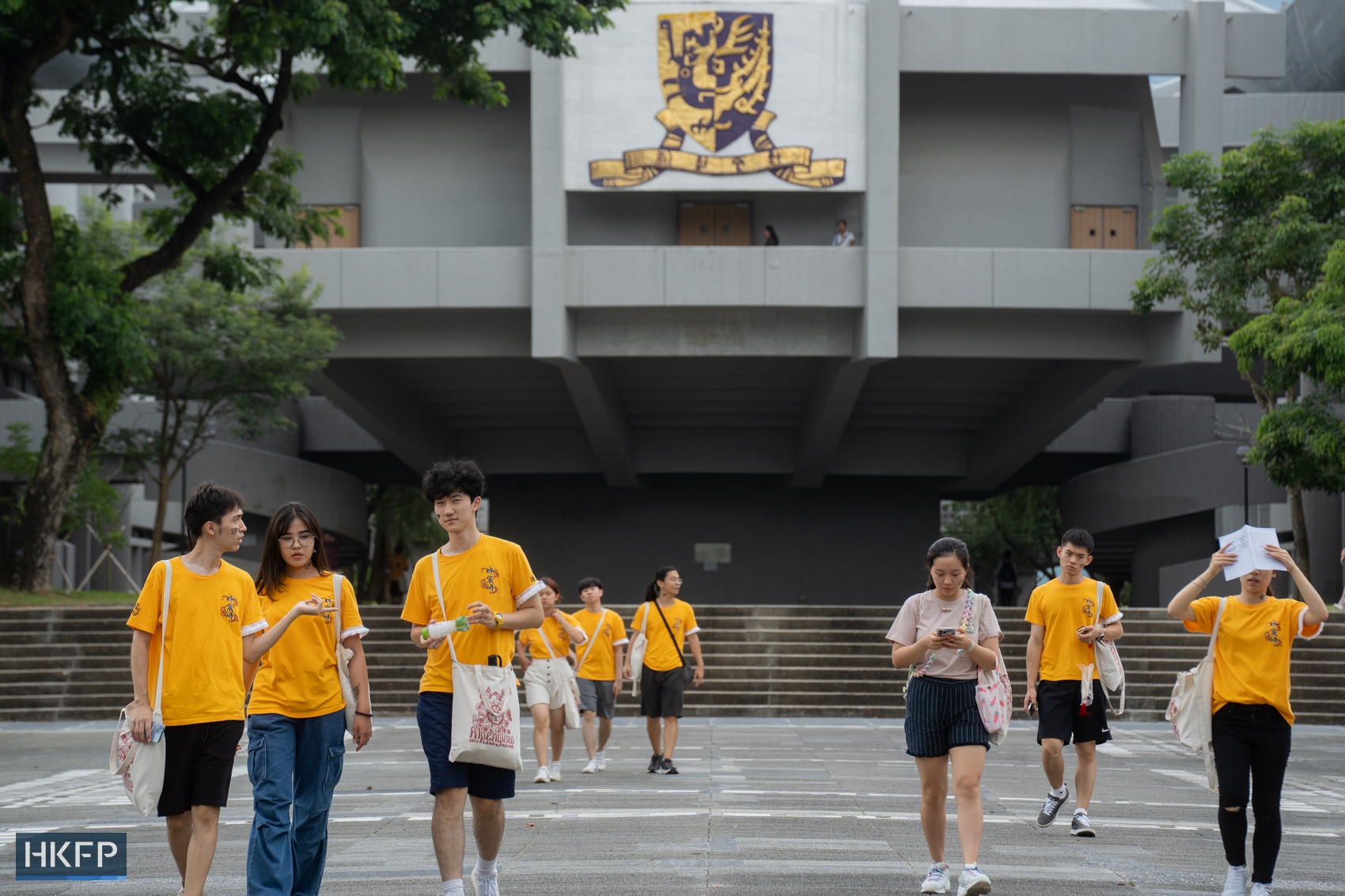Source: Hong Kong Free Press (1/20/24)
Opinion: Rocky road for those Hong Kong academics who are out of tune with the times
“It is difficult to feel optimistic about the future of Hong Kong universities generally if they are to be the playthings of political appointees who are unwilling or unable to respect the limits of their powers and rights,” writes Tim Hamlett.
By TIM HAMLETT
An amusing coincidence last week. A kind friend sent me an interesting op ed piece from the China Daily about recent events at Harvard University, where the president recently resigned under pressure from major donors.

Students at the Chinese University of Hong Kong. File photo: Kyle Lam/HKFP.
The writer of this piece mentioned, in passing, how lucky we were that such a thing could not happen in Hong Kong, because our universities enjoyed autonomy and were immune to interference from the government.
I proceeded to breakfast and the morning paper, which announced that the Vice Chancellor of the Chinese University of Hong Kong had resigned a few days into what was supposed to be a three-year contract.
The resigning V.C., Rocky Tuan, made all the usual polite noises: honour to serve… time is ripe… grateful to all concerned for their support. The chairman of the university council also made the usual polite noises: university is grateful … outstanding leadership, etc, etc, etc.
And behind all this, as the local media reported with varying degrees of candour, was a four-year campaign by the pro-government camp to get rid of Prof Tuan, who had, in 2019, not found the safe course for university leaders in a time of crisis, which was to hide in the office and say nothing.

Rocky Tuan. File Photo: Supplied.
It is not entirely clear which of Prof Tuan’s indiscretions was unforgivable. Was it an expression of sympathy for his rebellious students? Or was it his statement in an open letter of a fact then widely acknowledged but now almost unsayable: that some of the policing of protests had entailed more than a smidgeon of gratuitous violence from the forces of law and order?
Unlike the other local universities Chinese University was difficult for the government to pressure, because a majority of its council members were actually staff of the university itself, a legacy of its origins as a refuge for academics fleeing the liberation of the mainland.
This was changed by getting the Legislative Council to amend its governing ordinance, reducing the proportion of staff and increasing the proportion of outsiders, most of whom are government appointees. A similar change was reported last week in the ordinance governing the Baptist University. This was explained as providing “accountability to the public”, as if the public were going to appoint anyone to anything.
Defenders of the government will say that this does not amount to government intervention. The change to the Chinese U constitution was proposed by three members of the University Council. This will not wash. The three members are also members of the parties acceptable to the government: one DAB, one FTU, one Liberal.

Government officials attending the Chief Executive Q&A session at the Legislative Council on June 9, 2022. Photo: Lea Mok/HKFP.
In any case it does not matter whose idea it was. Having reformed Legco so that it is full of government supporters the government cannot escape responsibility for what happens in it. Nothing passes in Legco without the government’s approval.
It appears to be our leaders’ wish that nothing should happen in local universities without their approval either. This objective is to be achieved by appointing to university councils people who are willing to abuse their position.
It is an error to suppose, as a writer for the Standard did recently, that all changes in a university require the “approval of the university’s governing council.” Universities are supposed to be governed on a joint basis. Academic matters are to be decided by the Senate, financial and real estate ones by the council.
As teaching and research are the main functions expected of a university this should mean that most of the governing is actually done by the Senate. It is a long time since I was a member of a university council but I do not think this has changed, in other places. Certainly we did not aspire to fire the University Secretary, as the “reformed” Chinese U council did, or to veto a candidate for a deanship, as the University of Hong Kong council did.

Caritas Institute of Higher Education. File photo: Caritas Institute of Higher Education.
It is difficult to feel optimistic about the future of Hong Kong universities generally if they are to be the playthings of political appointees who are unwilling or unable to respect the limits of their powers and rights.
We are, it seems, going to stress quantity. Another private university was recently born, so little Hong Kong now has 12 universities. On current trends it will soon be easier to find a university here than a branch of the Hong Kong Bank.
Quality may be another matter. The occasional publicised incidents in which some luckless academic is fired, refused admission to Hong Kong or chased out by a wave of ominous publicity on the front pages of the pro-government press are just the tip of a large iceberg, comprising people who have been made to feel uncomfortable and unwanted because their opinions, or research activities, are not in tune with the new reformed times.
They leave. The idea that eager replacements will appear is perhaps a bit optimistic. News travels slowly in academic circles but it travels eventually. Many overseas universities now have at least one staff member who worked in Hong Kong for a while … and has the scars to show for it.